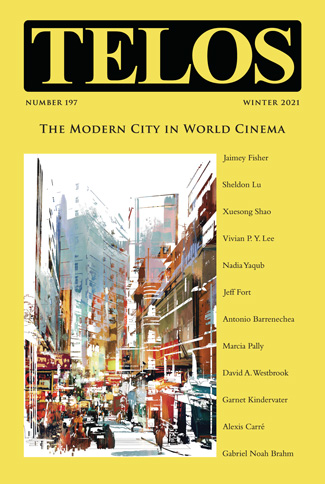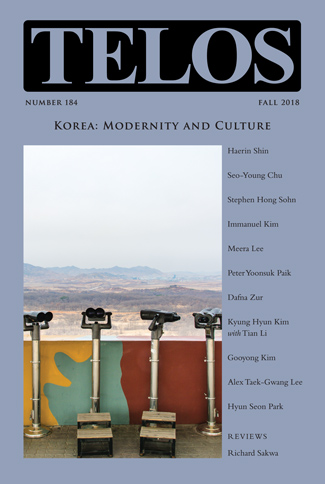In today’s episode of the Telos Press Podcast, David Pan talks with Greg Melleuish and Susanna Rizzo about their article “Universities: Truth, Reason, or Emotion?” from Telos 200 (Fall 2022). An excerpt of the article appears here. If your university has an online subscription to Telos, you can read the full article at the Telos Online website. For non-subscribers, learn how your university can begin a subscription to Telos at our library recommendation page. Print copies of Telos 200 are available for purchase in our online store.
|
Telos 197 (Winter 2021): The Modern City in World Cinema, edited by Jaimey Fisher and Sheldon Lu, is now available for purchase in our store. Individual subscriptions to Telos are also available in both print and online formats.
Peter Yoonsuk Paik’s “The Korean Wave and the Impasse of Theory” appears in Telos 184 (Fall 2018), a special issue on Korea. Read the full article at the Telos Online website, or purchase a print copy of the issue in our online store. Individual subscriptions to Telos are available in both print and online formats. South Korean popular culture has achieved startling success across much of the globe during the past decade. The first transnational form of popular culture that is not the legacy of an imperial project, the efforts to understand the significance of the “Korean wave” have been hampered by dominant scholarly approaches in the humanities that are not capable of grasping both its emergence and its appeal. This article argues that a key reason for the appeal of South Korean television and film is the fact that they explore the clash between tradition and modernity. South Korean media resonates with peoples across the world who are living out the conflicts between tradition and modernity and are thus eager for models for negotiating the competing demands of the two. Telos 184 (Fall 2018), a special issue on Korea, edited by Haerin Shin, is now available for purchase in our store. Ning Wang’s “From Shanghai Modern to Shanghai Postmodern: A Cosmopolitan View of China’s Modernization” appears in Telos 180 (Fall 2017), a special issue on Cosmopolitanism and China. Read the full article at the Telos Online website, or purchase a print copy of the issue in our online store. Individual subscriptions to Telos are now available in both print and online formats. To discuss the issue of cosmopolitanism in the Chinese context is, as in the Western context, no longer new to China’s humanities intellectuals, for this issue once did attract Chinese intellectuals in the 1920s when nationalism dominated Chinese academia and intellectual circles. Furthermore, it indeed had some parallel elements in ancient Chinese philosophy. It is therefore quite natural that cosmopolitanism was not so attractive when China, according to Dr. Sun Yat-sen, was not qualified enough to talk about cosmopolitanism as it was still poor and backward at the time. In the current era of globalization, along with the increasingly important role played by China and its leaders, more and more scholars have been paying considerable attention to this issue with regard to global culture and world literature. At the beginning of his 1961 study The Death of Tragedy, George Steiner claimed that Christian “optimism” contributed to the demise of tragic drama in modernity. The ensuing chapters of The Death of Tragedy actually offer a more nuanced account, though, in which Steiner finds tragic potential in the doctrine of original sin. In subsequent essays, Steiner has doubled down on his claim that tragedy must be bleak. Indeed, he now holds up an ideal of hopeless “absolute tragedy.” In these later writings, Steiner has also continued to show interest in original sin, even claiming in a 2004 essay that original sin is the core of tragic art. |
||||
|
Telos Press Publishing · PO Box 811 · Candor, NY 13743 · Phone: 212-228-6479 Privacy Policy · Data Protection Copyright © 2025 Telos Press Publishing · All Rights Reserved |
||||




